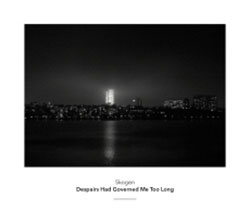
The great composer John Cage was an amateur mycologist, which is the formal term for someone who studies mushrooms. Cage was reluctant to draw a connection between his two passions, famously stating ''I am not interested in the relationships between sounds and mushrooms any more than I am in those between sounds and other sounds." Nonetheless, Cage's mushroom quest involved spending time in forests, where he undoubtedly lent his tremendous ears to the subtle doings of the natural world. In the same spirit, the group Skogen (which means ''the forest'' in Swedish) takes inspiration from the music that emerges from nature. And surely Cage has inspired Skogen's majestic long-form pieces, which explore the intersection between composition and improvisation, and warmly blend all manner of sounds and other sounds.
In Despairs Had Governed Me Too Long, the Sweden-based ensemble has created a gorgeous, 56-minute atmospheric field. The piece was composed by Skogen's founder, Magnus Granberg, who derived the harmonic and rhythmic foundations from 17th-century English composer John Dowland's song ''If My Complaints Could Passions Move.'' From this compositional jumping-off point, the group unfolds a gracefully meandering improvisation. It's a quiet space, but it is not silent: the piece is full of sounds that arise and disappear within the unobtrusive, hypnotic environment. Expansive single notes and pure chimes predominate, with discreet background evolutions that include tiny pools of dissonance, prisms of electronic shards, and sensitive drones. These shifting sounds are exquisitely paced, creating a harmonious progression that's both generous and patient.
And just as a forest welcomes all noises within it, this music mingles beautifully with the sounds of everyday life. If one plays the CD on a sunny spring day, the song gratefully accepts lawnmowers, children's laughter, and barking dogs. Likewise, during stormy weather, the music has space for raindrop patter, thunder rumbles, and the coo of a mourning dove. That's how wide-open this work is: the piece stands alone, and it is most definitely ''finished,'' but it is also receptive to changes and additions from the environment it is played in, which is a truly remarkable achievement.
As for the title, the piece does feel like the prolonged sensation of waking up after a long and perhaps despairing sleep. The music offers a host of subtle sensations, a slow thoughtful journey that shines a light and speaks of hope. This is a graceful, peaceful, meditative mindscape: it is life-affirming and, in the quietest way possible, wildly exciting. Perhaps this is what it sounds like to hunt for mushrooms in a hushed and ancient forest, with ears that are wide-open and free.
Comments and Feedback:
|



